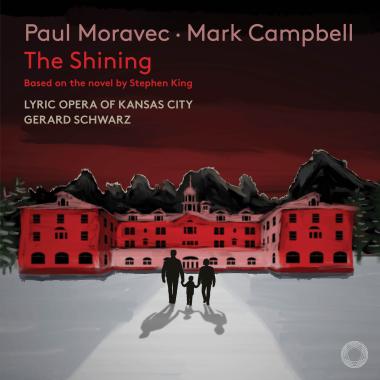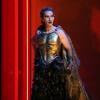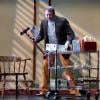
“Stephen King’s The Shining is naturally operatic,” composer Paul Moravec declares in his liner notes to Lyric Opera of Kansas City’s live recording of The Shining, his opera with librettist Mark Campbell, now available from Pentatone. “It sings. The story strikingly dramatizes three of the most basic elements of opera — love, death, and power.”
Yes. Love, death, and power. The challenge, of course, is to resist verging on melodrama when telling a tale in which these three elements dance together diabolically.

In this respect, Moravec and Campbell succeed admirably. In setting King’s lurid tale of ghosts, supernatural possession, violence, and madness, Moravec never overdoes the spooky sound effects or goes over the top musically. His score, for the most part, rings true to the story. A family of three — Jack Torrance (baritone Edward Parks), Wendy Torrance (soprano Kelly Kaduce), and son Danny (treble/boy soprano Tristan Hallett) — head to a remote area of the Rocky Mountains to caretake the Overlook Hotel for the winter, only to discover Jack increasingly possessed by the dark and dangerous energies that inhabit the hotel from traumas long past. While there is nothing groundbreaking or revelatory about music and libretto, the drama is handled deftly and with assurance. Moravec’s orchestral interludes signifying the passage of time are effective without being as memorable as those in repertory staples such as Madame Butterfly, Wozzeck, or Peter Grimes.
Nonetheless, Campbell’s effort to compress a complex story into a two-act, 110-minute opera has one serious shortcoming. Jack’s descent into madness comes about so quickly that it wouldn’t work unless Campbell expected most audience members to be already familiar with King’s novel and/or Stanley Kubrick’s cinematic adaptation starring Jack Nicholson. As much as Campbell’s libretto makes sense, a lot of complex emotional and metaphysical material has been overly compressed.
The recording has one serious vocal shortcoming. As superb as Parks is — his voice is solid, beautiful, capable of a wide range of emotional expression, and continually captivating — Kaduce’s harsh voice and excessively wide vibrato throughout her range are hard to listen to for prolonged periods; they undo the sympathy one might otherwise have for her character, a besieged woman struggling to save herself and her family.
Still, you might overlook this flaw for the mastery of Moravec and most of the other cast members. Hallett handles his role wonderfully. If he performs as well once his voice turns, a fine career may be in his future. The secondary characters — there are 15 in total, ranging from the apparition of Jack’s abusive father, Mark Torrance (baritone Malcolm MacKenzie), to the dog (mezzo-soprano Jennifer Weiman) — are portrayed skillfully, and the Lyric Opera of Kansas City Chorus sings as well under chorus master Piotr Wiśniewski as the orchestra plays under veteran conductor Gerard Schwarz. Why everyone settled on operatic English rather than a far more natural and accessible style of pronunciation is beyond me. There’s no reason for highfalutin pretense in an operatic setting of a bestseller by one of the most popular novelists of the last half century.




